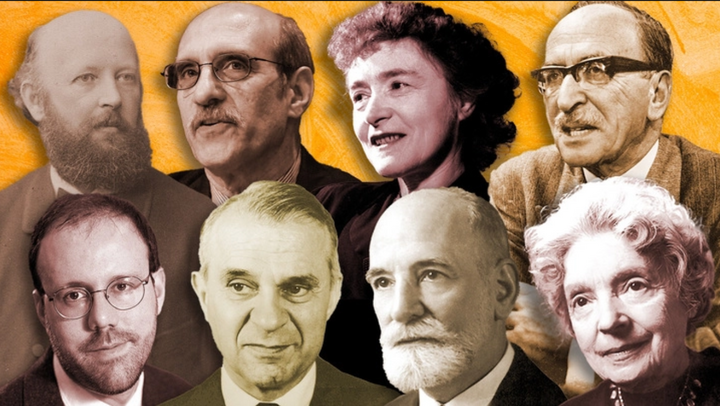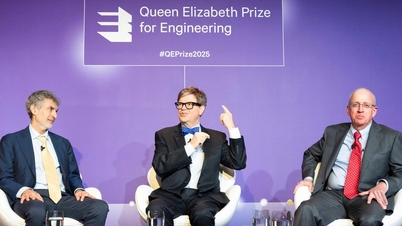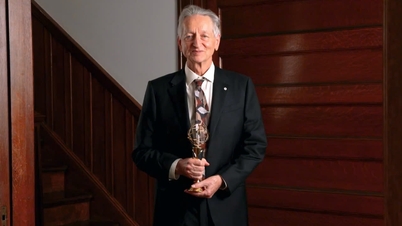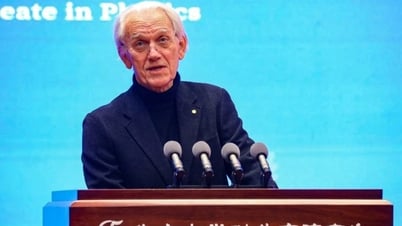The Nobel Prize, established by scientist Alfred Nobel, is the most prestigious award to honor scientists who have made special contributions to humanity in the fields of Physics, Chemistry, Medicine, Literature, Peace and Economics .
In terms of ethnicity, Jews are one of the most influential peoples in the history of the Nobel Prize. Making up only 0.2% of the world's population (about 14.2 million people), Jews account for 22% of the total number of awards.

Several Jewish Nobel Prize-winning scientists have made groundbreaking contributions.
Overcoming adversity
The Jewish people possess one of the oldest cultures and histories of mankind, contemporaneous with the civilizations of Egypt, Mesopotamia and ancient Greece. However, history forced this nation to live in exile and fragmentation to maintain survival, overcoming the cruel fates of the times.
Waves of repression, especially the rise of Nazism in the early 20th century, forced large numbers of Jewish intellectuals and scientists to emigrate and seek refuge around the globe. Despite this, the Jews were industrious, persistent, and resilient, and they were not assimilated and had a strong sense of self-improvement.
In the face of widespread discrimination and systemic barriers, Jewish individuals have demonstrated a steadfast determination to rise to the levels of knowledge and scholarship. They have looked to intellectual pursuits not only as a means of self-empowerment but also as a path to gaining legitimate recognition in society.
The 20th century began with a massive wave of Jewish immigration to America and European countries. Some researchers believe that in each new land, most Jews turned to science because they believed it was a way to overcome the old world order - where most Jews had no place in power, wealth and social status.
“From making scientific discoveries that explain the world around us to creating literature that gives meaning to the world, and from pioneering medical breakthroughs that save countless lives to leading peace-making initiatives that save countless lives, generations of Jewish Nobel Prize winners have made an enormous contribution to the world in which we all live,” said former British Prime Minister Theresa May in her book Jewish Nobel Prize Winners.
Cultural characteristics: Emphasis on learning and erudition
Political scientist Charles Murray wrote in his 2007 essay Jewish Genius that “genes explain the high IQ of Jews.” Israeli scientist Aaron Ciechanover, winner of the 2005 Nobel Prize in Chemistry, said that “the human brain is the only natural resource that Israel possesses.” However, this hypothesis has been met with much skepticism.
Meanwhile, researcher Ronald Gerstl said: “Jewish cultural values based on family upbringing, dedication to education, self-motivation, perseverance, resilience in the face of adversity or simply hard work have certainly contributed to their success,” according to the Jewish Chronicle.
At the core of the Jewish tradition is a deep reverence for learning. This deep-rooted reverence for the pursuit of wisdom reflects the belief that knowledge is a priceless treasure. Jews believe that “To defend a country, you need an army, but to defend your identity, you need a school.”
This attitude has led to a culture of reading becoming a habit. The 2005 Nobel Prize winner in Economics from Israel, Mr. Robert Aumann, said that every Jewish home is filled with bookshelves.
That cultural foundation has played a pivotal role in nurturing generations of scholars, scientists, and thinkers in lands with a Jewish imprint. Investment in education, both at the family and community levels, has served as the foundation for fostering an environment conducive to learning.
In addition, Jewish tradition has long supported inquiry, critical thinking, and intellectual exploration. The Talmudic scriptures of Judaism value rigorous discourse and the pursuit of knowledge, including the admonition that “wisdom is more important than brawn.”
These cultural and religious principles harmonized perfectly with the scientific methodology that nurtured the Jewish personality in an environment where innovation and discovery flourished.
Between 1901 and 2023, of the 965 Nobel Prize winners, 214 were Jewish or had at least one Jewish parent, or 22% of all recipients. Jews make up only 0.2% of the world's population, meaning their percentage of winners is 100 times higher than their percentage of the world's population.
Jews were awarded in all six award categories, with the following distribution in the areas:
Chemistry: 36 (19%)
Economy: 38 (41%)
Literature: 16 (13%)
Peace: 9 (8%)
Physics: 56 (25%)
Biomedical: 59 (26%)
Adolf von Baeyer, who received the Nobel Prize in Chemistry in 1905, was the first Jewish person to receive the prize. Arthur Ashkin, a Jewish American who was 96 years old at the time of his award, is the oldest person to receive a Nobel Prize, according to Business Insider.
(Source: Vietnamnet)
Source




![[Photo] Special flag-raising ceremony to celebrate the 135th birthday of President Ho Chi Minh](https://vphoto.vietnam.vn/thumb/1200x675/vietnam/resource/IMAGE/2025/5/19/1c5ec80249cc4ef3a5226e366e7e58f1)


![[Photo] Party and State leaders visit President Ho Chi Minh's Mausoleum](https://vphoto.vietnam.vn/thumb/1200x675/vietnam/resource/IMAGE/2025/5/19/d7e02f242af84752902b22a7208674ac)


















































































![[VIDEO] - Enhancing the value of Quang Nam OCOP products through trade connections](https://vphoto.vietnam.vn/thumb/402x226/vietnam/resource/IMAGE/2025/5/17/5be5b5fff1f14914986fad159097a677)








Comment (0)